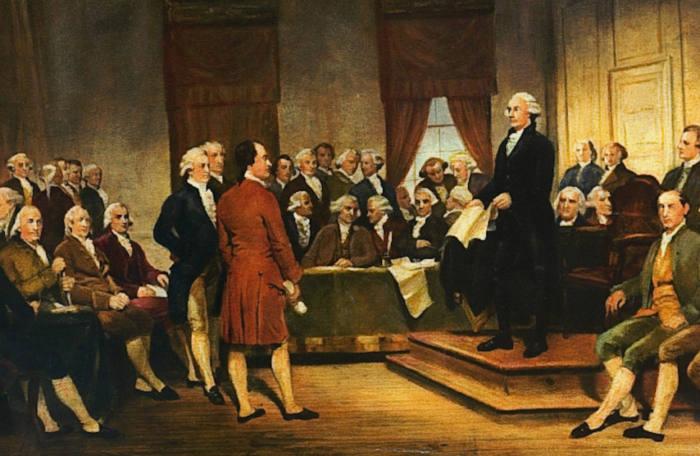In America, political grievances must go through the system, not around it
“AMONG the numerous advantages promised by a well constructed Union, none deserves to be more accurately developed than its tendency to break and control the violence of faction. The friend of popular governments never finds himself so much alarmed for their character and fate, as when he contemplates their propensity to this dangerous vice.”
— James Madison, Federalist No. 10
By the end of his administration, George Washington saw the rise of partisan and regional factions as an existential threat to the young republic. In his Farewell Address of 1796, he used the full force of his name and reputation to advocate for a civic patriotism that valued national unity and loyalty to the Constitution as the highest civic virtues.
“The unity of government which constitutes you one people is also now dear to you. It is justly so, for it is a main pillar in the edifice of your real independence, the support of your tranquility at home, your peace abroad; of your safety; of your prosperity; of that very liberty which you so highly prize,” he said.
“But as it is easy to foresee that, from different causes and from different quarters, much pains will be taken, many artifices employed to weaken in your minds the conviction of this truth; as this is the point in your political fortress against which the batteries of internal and external enemies will be most constantly and actively (though often covertly and insidiously) directed, it is of infinite moment that you should properly estimate the immense value of your national union to your collective and individual happiness; that you should cherish a cordial, habitual, and immovable attachment to it; accustoming yourselves to think and speak of it as of the palladium of your political safety and prosperity; watching for its preservation with jealous anxiety; discountenancing whatever may suggest even a suspicion that it can in any event be abandoned; and indignantly frowning upon the first dawning of every attempt to alienate any portion of our country from the rest, or to enfeeble the sacred ties which now link together the various parts.”
In Federalist No. 10, James Madison defined a faction as “a number of citizens, whether amounting to a majority or a minority of the whole, who are united and actuated by some common impulse of passion, or of interest, adversed to the rights of other citizens, or to the permanent and aggregate interests of the community.”
In a land of free peoples, there was no hope of eliminating faction, Madison wrote. “Liberty is to faction what air is to fire.”
A pure democracy provides no remedy for one faction dominating another, Madison believed. But representative government does.
“A republic, by which I mean a government in which the scheme of representation takes place, opens a different prospect, and promises the cure for which we are seeking.”
The Constitution is a blueprint for a machine of government in which the furies and impulses of the people are cooled by filtering them through a complex system designed to turn heated passions into reasoned arguments.
Everyone learns in civics class about the checks and balances built into the Constitution to protect liberty by dividing power. But another other critical design function of the U.S. Constitution was to cool public passions.
The House, Senate and Electoral College are filtering mechanisms. Through these institutions, the American people are forced to discuss and debate, collaborate and compromise, and hold the union together.
Washington, Madison and other Framers believed that the rights and liberties of the American people were protected and preserved by this Constitutional framework itself. They viewed the Constitutional system as both the foundation and the ultimate guarantor of our freedoms.
“Liberty itself will find in such a government, with powers properly distributed and adjusted, its surest guardian,” Washington said in his Farewell Address.
That’s why the federal oath of office is an oath to “support and defend the Constitution of the United States against all enemies, foreign and domestic….” The oath is to the Constitution, not to the president, the people, or any other competing source of authority.
And it is why any end run around the constitutional system is a threat to the freedom of all Americans.
For these reasons, President Washington himself led the army to put down the Whiskey Rebellion, though the rebels had legitimate grievances. In his proclamation, he wrote that the insurrection threatened “the very existence of government and the fundamental principles of social order.”
At the Statehouse in Concord on Wednesday and Thursday, pro-Trump protesters waved flags, gave speeches, and vented their frustrations and anger in a peaceable assembly fully protected by and consistent with our constitutional system.
By contrast, the storming of the Capitol on Jan. 6 was an attempt to bypass the constitutional system to impose one faction’s preferred political outcome.
There is no doubt how Washington and the other Framers of the Constitution would have viewed that effort.
Our federal republic is a precious inheritance. The republican systems through which our local, state, and federal governments channel political disputes deserve our affection and defense because they are the mechanisms that protect our liberties.
Threats to these systems are threats to liberty itself.



